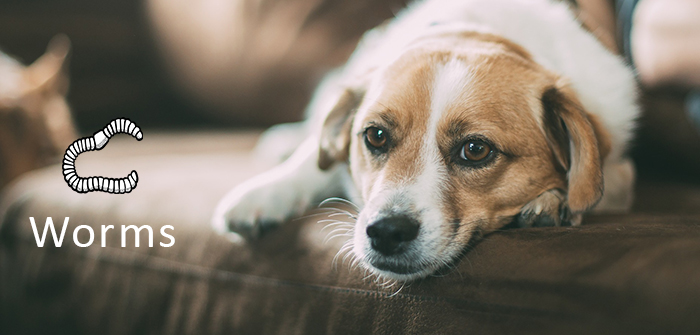5 Most-Common Signs That Shows Your Dog has Worms
Have you noticed your dog behavior has changed suddenly recently? It may be devised that your dog may be suffering from worm infection. Worms are internal parasites that can negatively impact the health of your furry pal. They can cause certain health problems in dogs and at large can be devastating. Worm infection in dogs occur due to numerous factors like infected mothers can transmit it to the fetus in the uterus or through breastfeeding or a dog who eats dirt or contaminated objects can get infected. When looking for signs and symptoms for worms, each kind of worm infect differently and therefore it is difficult to figure out which type of worm infection is your pet suffering from.
Look for these signs in your dog for worm infection.
Potbelly
When infected with worms, dogs usually come up with the most common sign of potbelly. Puppies are most likely to get potbellies as they contract worms from their mothers. If your growing puppy is eating normal amount food and notice this growth, it is necessary that you visit a vet.
Robbing The Bum
If you find your dog rubbing his butt against any hard material, furniture, ground or carpet, it is a sign of tapeworm. When notice closely, you can find that the dog’s stool may contain white rice or grain like segments of tapeworms. Furthermore, tapeworms may also appear around the anal regions. These filthy worms cause irritation and make dogs rub rear-ends against any hard material to relieve them from itching.
Diarrhea
Most common symptom of worm infection is diarrhea. Pets having worn infection can easily experience irregular bowel movements and chronic loose motions. Hookworms can cause a black-tar looking stool or frequent attacks of diarrhea and whipworms produce excessively watery stool. Noticing these signs, immediately contact your vet to test for worms.
Lethargy or Fatigue
There can be a lot different reasons for lethargy or fatigue in dogs. One of the most viable reasons can be worm infection. Decreased desire to play or lack of energy tend to be a sign of having hookworms or roundworms. Hookworms are parasites with a hook-like structure that attaches to dog’s intestinal wall and leeches away blood. As these worms mostly consume blood from the dog, they are most likely to become anemic and feel lethargy with energy level decreasing.
Coughing
Don’t take coughing in your dog as just a sign of cold. In most cases, severe coughing with no apparent reason is attached to heartworm infection. Mosquitoes are the carriers of heartworm larvae and they transmit these microorganisms to dogs. Once infested, these worms multiply at a lightning speed in the blood stream. The most common sign of this disease is coughing, which gradually leads to severe chest pain. If you find this in your furry pal, don’t be late to take your pet to a vet. These parasites are quite dangerous as they directly attack vital organs of the dog.
Treatment and Prevention
Depending on the worm infection, your vet will prescribe the treatment. Normally, various oral medications for deworming are available. Some wormers come in liquid form, which need to be used topically. Wormers like popantel, drontal, cazitel and heartgard plus are highly effective in controlling worm infection.


